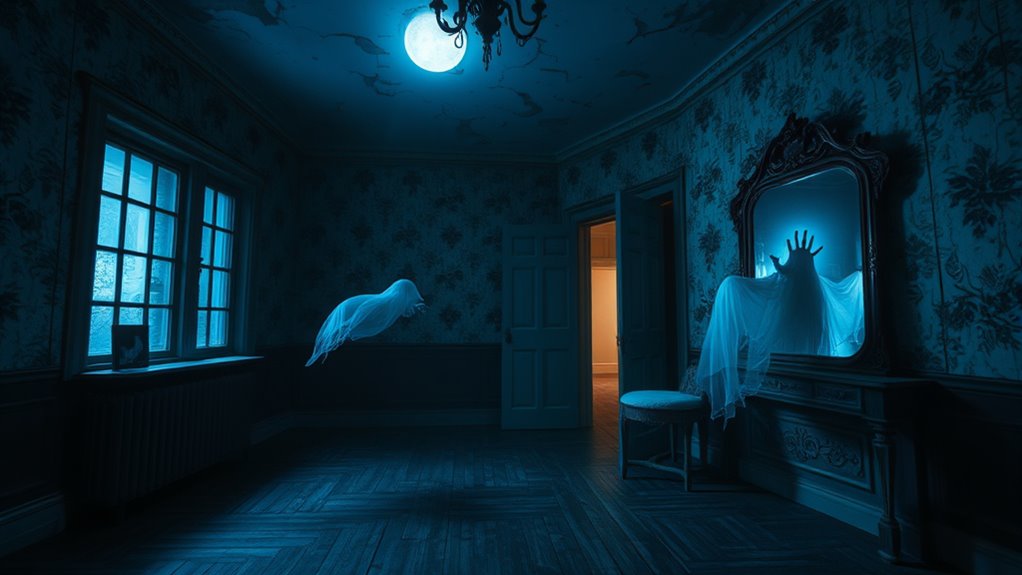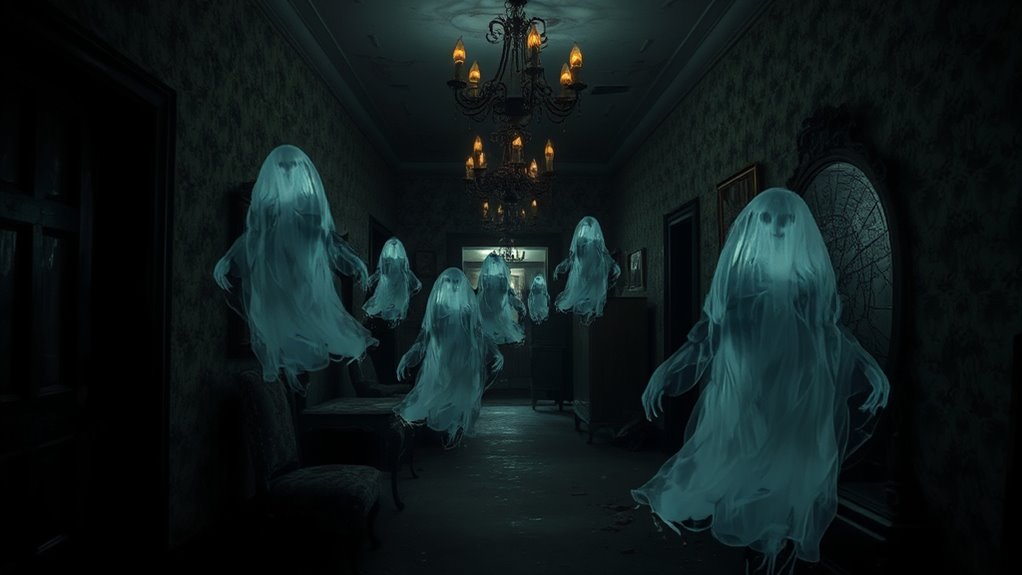Ghosts often stay behind because they have unresolved emotional attachments, unfinished business, or unresolved feelings that keep them tethered to the physical world. They might not realize they have passed on or seek closure, especially if strong emotions or trauma are involved. Environmental energy imprints from intense moments can also create residual hauntings with no conscious spirit involved. To understand why some spirits linger or how to help them move on, there’s more to discover beyond this.
Key Takeaways
- Spirits stay due to unresolved emotions, regrets, or unfinished business that keep them emotionally tethered.
- Residual energy from intense events creates lingering, replaying impressions that seem ghostly.
- Active spirits may linger because of emotional attachments, unresolved conflicts, or fear of crossing over.
- Locations associated with trauma or strong emotions often hold residual energy or spirits.
- Lack of awareness or inability to find closure prevents spirits from moving on to the afterlife.

Many believe that ghosts remain behind because they have unfinished business or unresolved feelings. This idea suggests that spirits can’t move on because something in their past keeps pulling them back. Often, this unresolved energy is a key reason spirits linger in certain places. Residual energy, which is the lingering imprint of intense emotions or events, can create a persistent ghostly presence. Unlike active spirits that seem to interact with the living, residual energy is more like a recording of past moments replaying over and over. You might notice this as strange sounds, fleeting images, or sensations that feel out of place. These echoes of the past aren’t necessarily conscious spirits but rather the environment holding onto the energy of significant moments. When someone experiences trauma, grief, or intense emotion before death, that energy can become trapped in the location. This is often why certain sites seem to have a repetitive, unchanging ghostly presence—because the residual energy is constantly being replayed, creating the illusion of a haunting without a conscious spirit. Additionally, emotional attachments can intensify the lingering presence, making it harder for spirits to find peace. Recognizing the role of Residual energy helps explain why some locations seem haunted despite the absence of an active spirit. In many cases, these spirits stay behind because they still have unfinished business. They might not realize they’ve passed on or could be unable to find peace due to emotional attachments or regrets. For example, a loved one might remain in a house, waiting for closure or trying to communicate with the living. Sometimes they’re stuck because they don’t understand that they’re no longer alive, or they’re afraid to move on. Other times, they’re holding onto a specific event or person, unsure of how to let go. The emotional energy attached to these spirits can act like a tether, preventing them from crossing over. This emotional energy can be compounded by mental state or unresolved conflicts that keep spirits tethered to the physical world. The key difference here is that these spirits are often driven by a sense of obligation, guilt, or longing, which keeps them tethered to the physical world. Their unresolved feelings, whether grief or anger, act like emotional anchors, preventing them from crossing over. Recognizing the importance of understanding these factors can be key in ghost investigations, as it guides how to approach and help spirits find peace. Understanding the nature of their stay can help in finding ways to provide the closure they need or to dispel the lingering energy that fuels their presence.
Frequently Asked Questions
Can Ghosts Be Malevolent or Are They Always Harmless?
You might wonder if ghosts are always harmless or if they can be malevolent. Sometimes, residual energy or strong emotional attachments cause spirits to act negatively, especially if they’re distressed or angry. Not all ghosts are malevolent—many are simply trapped by unfinished business or lingering memories. However, some can be harmful, driven by fear or resentment. It’s important to approach all spirits with caution and respect.
Do Ghosts Communicate Intentionally or Randomly?
Imagine a whisper floating through a foggy night—ghosts can communicate in both intentional and random ways. Sometimes, they reach out deliberately, like a lighthouse guiding ships home, seeking closure or connection. Other times, their messages drift unpredictably, like leaves caught in the wind, with random interactions that puzzle and intrigue. Whether purposeful or spontaneous, their communication reflects a lingering need to be understood beyond the veil.
Are Certain Locations More Prone to Hauntings?
Certain locations are more prone to hauntings because they serve as geographic hotspots for paranormal activity. You’ll find haunted locations often include old castles, battlefields, or abandoned buildings where emotional events or violence occurred. These places tend to hold residual energy, making them hotspots for ghost sightings. Your curiosity about haunted locations can lead you to explore these sites, where the environment’s history and energy make hauntings more common.
How Do Spirits Choose to Stay Behind?
Imagine a spider weaving its web, caught on a single thread—spirits stay behind because of spirit attachment or unresolved grief. When they can’t let go, they linger like shadows in the corners of your mind. These lingering souls often cling to places or people that meant everything to them, unable to find peace. Their stay is fueled by unfinished business, anchoring them to this world until their emotional ties are resolved.
Can a Person’S Energy Influence Ghost Activity?
Your energy can influence ghost activity by leaving an energy imprint or emotional residue in a space. If you’re feeling strong emotions like fear, anger, or grief, those feelings can intensify or attract spirits. This emotional residue sticks around, creating a energetic signature that ghosts may respond to or feed off of. Your mental state and emotional energy play a key role in how active or noticeable ghostly activity becomes.
Conclusion
So, next time you hear a bump in the night, remember—it’s just a ghost auditioning for a stay-at-home gig. They’re probably just hanging around because they can’t resist the thrill of scaring you or maybe they’re just waiting for their overdue Netflix subscription to expire. Either way, you’ve got plenty of company in the afterlife’s never-ending waiting room. Who knew being a ghost was such a long-term commitment? Boo-tiful, isn’t it?









